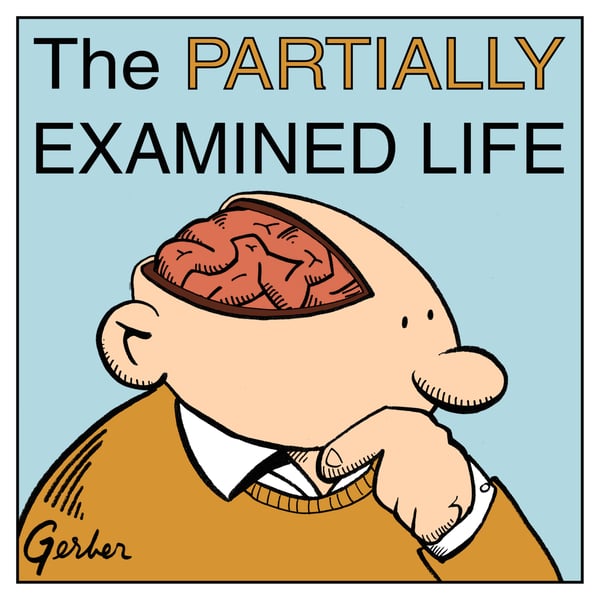Ep. 323: Acquiring Language: Tomasello vs. Chomsky (Part Two)
The Partially Examined Life Philosophy Podcast
Mark Linsenmayer
4.6 • 2.3K Ratings
🗓️ 28 August 2023
⏱️ 48 minutes
🧾️ Download transcript
Summary
Continuing on Michael Tomasello's "Language Is Not an Instinct" (1995) and Constructing a Language: A Usage-Based Theory of Language Acquisition (2003), as contrasted with Chomsky universal grammar (the flag that Steven Pinker continues to carry). With guest Christopher Heath.
Get more at partiallyexaminedlife.com. Visit partiallyexaminedlife.com/support to get ad-free episodes and a supporter-exclusive Nightcap discussion about cognitive science, evolutionary psychology, and more.
Learn about the online Core Philosophy Texts course Mark is running this fall at partiallyexaminedlife.com/class.
Transcript
Click on a timestamp to play from that location
| 0:00.0 | This is a partially examined life episode, it's 323, part two, we've been talking about |
| 0:12.6 | the work of Michael Tomasello, constructing a language, a usage-based theory of language |
| 0:17.2 | acquisition, and his article language is not an instinct. |
| 0:20.9 | I think there were two things we're going to get to more of his details of his theory |
| 0:27.2 | of language acquisition and how this relates to pragmatics, and also just, I think we can |
| 0:33.2 | still talk more about this overall difference in paradigm between the Chomsky and cognitive |
| 0:39.5 | science, pinkarian point of view, and what Tomasello is proposing, because it does line up very |
| 0:46.7 | well with the rationalist versus empiricists, seemingly, even though pinker certainly |
| 0:52.2 | says, oh yeah, I'm referring to lots of studies, we of course care what the data says, |
| 0:57.1 | but all these guys think that they're doing modern science, it may be, I don't know |
| 1:00.2 | about Chomsky himself, whether linguistics itself, it seems like it's kind of like mathematics |
| 1:05.3 | in being this sort of geek-oriented self-contained, like, being, so I'm so, this is so cool, the way |
| 1:12.5 | that he's definitely not on as much of the empiricals. |
| 1:15.3 | I think pinker even mentions that Chomsky sort of put together this formalist account |
| 1:19.5 | and pinker and some others are kind of the guys who go out and research and see if his |
| 1:23.8 | claims are true, because he's made several claims and given people things to experiment |
| 1:28.4 | on. |
| 1:29.4 | Like, the famous example Chomsky gives is the forming of a question, like in the, I guess |
| 1:35.0 | in English, something like, Jacob is happy today, and then you move the is to the front |
| 1:40.0 | is Jacob happy today, he sort of moved the auxiliary, he claims that if you have a phrase |
| 1:45.6 | that has a second auxiliary is, children will know which is to move to the front. |
| 1:51.8 | So they won't need any testing to figure out which auxiliary is to move, they'll just |
... |
Please login to see the full transcript.
Disclaimer: The podcast and artwork embedded on this page are from Mark Linsenmayer, and are the property of its owner and not affiliated with or endorsed by Tapesearch.
Generated transcripts are the property of Mark Linsenmayer and are distributed freely under the Fair Use doctrine. Transcripts generated by Tapesearch are not guaranteed to be accurate.
Copyright © Tapesearch 2025.

